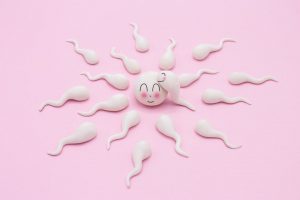A groundbreaking study led by University of Colorado Anschutz Medical Campus researchers led by Nickole Moon, PhD, first author of the study and a student at CU Anschutz who is part of the research team, shows that stress-induced changes in sperm motility occur after a stressful event, not during it, and improve sperm performance. This discovery is important for understanding how stress affects the reproductive process to improve fetal development outcomes. The study was published in Nature Communications.
Sperm Quality Continues to Decline
Over the past five decades, sperm quality has declined significantly, coinciding with environmental stress. This new research shows how stress affects the ability of sperm to move through the female reproductive system to fertilize an egg (motility). The researchers observed changes in extracellular vesicles (EVs), small particles released by the male reproductive tract that play a role in sperm development and maturation. These changes occurred after the stressor was over, not during the stressful experience.
“Our results show a significant, time-dependent increase in sperm motility following perceived stress, which is consistent with previous studies of microRNA changes in human sperm,” said Tracy Bale, PhD, lead author and Anschutz Foundation Endowed Professor in Integrated Women’s Mental and Physical Health Research at CU Anschutz’s Ludeman Center. This timing, in which sperm function improves after stress, could be evolutionarily beneficial to increase birth rates, especially after difficult times like during the COVID pandemic. The studies were conducted on both men and animal models. In both cases, the stress-induced EVs improved sperm motility and mitochondrial respiration, the chemical energy needed for the cell’s biochemical reactions.
How Stress Affects Reproduction
As the results were the same in both humans and animal models, the findings suggest that this may be a universal coping mechanism for all species, which could offer insights into wider implications for reproductive health. Although the study focused on men, the researchers emphasize the importance of examining how stress affects both partners in the fertility process. In addition, the researchers are ultimately interested in how these differences affect the development of the fetus, particularly the brain.
The effects of stress on germ cells, fertility and those mechanisms underlying the transmission of parental stress experiences across generations are not well understood,” said Neill Epperson, MD, professor and chair of the CU Department of Psychiatry and Bale’s partner in the studies. By continuing to recruit participants for these studies and conducting thorough stress assessments in addition to working in the lab, the researchers hope to gain a deeper understanding of how past stressors may affect future offspring.”
Bale reiterates the importance of raising awareness of how stress affects reproduction. As stress is an everyday part of life, understanding its effects on reproduction and development is crucial for improving fertility and managing wider ecological impacts on endangered species. The team is conducting further studies focused on understanding how stress information is transmitted into EVs and how this affects fertilization. They are also investigating the effects on brain development. In addition, the team will launch an experimental study to test this model and further investigate the relationship between EVs and sperm in seminal fluid.





